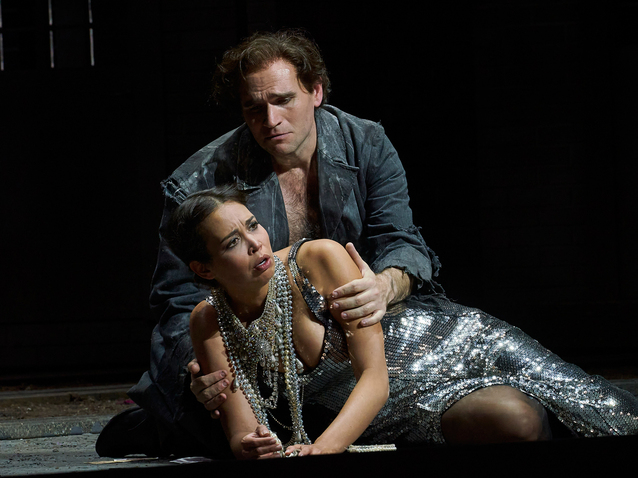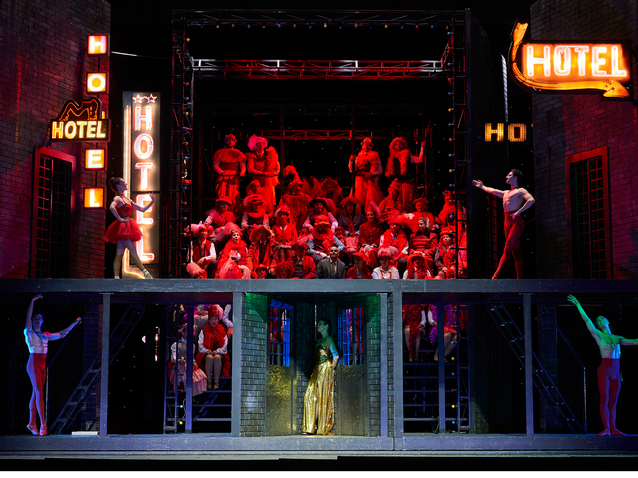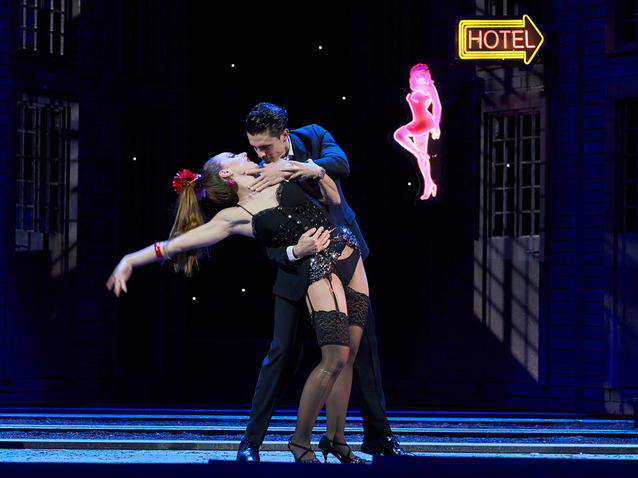 © David Ruano
© David Ruano
Nadine Sierra was the big winner on the opening night of Manon. Her voice is at its best, splendid. The high notes are easy, well timbred, and brilliant. The dynamic control is of great quality and the projection of the singing, without being magnificent, is fully satisfactory. The exhaustive technical control of breathing and emission allows her to sing naturally and with and ease, without apparent physical effort and without dropping in performance over the course of a show lasting several hours.
Fully committed to the dramatic proposal of the production, Sierra, who had already participated in previous performances of this production, theatrically delivered to perfection and made her character's inner conflict between desire and guilt scenically explicit and wisely evolved, from the dangerous naivety - a little "Lolita" - of the beginning to the bitterness of the end.
Her performance would have reached perfection had she controlled her non-singing moments better. Manon, in fact, is still structurally an opéra-comique and, although it represents a renovation in relation to traditional opéra-comique, there are still spoken dialogues that must be resolved by projecting the voice well so that they reach the entire hall with clarity. In this sense Sierra still has room for improvement.
Michael Fabiano was just a notch below Sierra. His Des Grieux was even better than his Cavaradossi of just over three months ago. The voice is ideal for this role, rising very well at the top where it becomes luminous and perhaps a little more limited at the bottom. Fabiano does not yet have a complete command of the vocal demi-teintes of his character and has a tendency to remain on the extremes. Like Sierra, he could improve the projection of his voice. Dramatically, his character, without presenting the psychological complexity of Manon's, offers many possibilities for a good actor and Fabiano exploited them all.
Alexandre Duhamel's Lescaut was very correct in all respects. He could have been a little more mellifluous and perverse, the character allowed it and the situation demanded it.
Laurent Naouri's Comte des Grieux, who knows the tradition of opéra-comique when it comes to the treatment of spoken dialogue, was absolutely satisfactory. The singing was fine, and scenically he managed to give some theatrical thickness to a character that was totally flat and dramatically predictable.
The trio of coquettes formed by Inés Ballesteros, Anna Tobella and Anaïs Masllorens were good, and Albert Casals' Guillot de Morfontaine and Tomeu Bibiloni's Bretigny were very complete in all respects.
The chorus, a little cramped at times due to the demands of the scenography, gave a good performance.

Manon, Gran Teatre del Liceu (2023) (c) David Ruano
The third protagonist of the evening was conductor Marc Minkowski. He knows French opera of this period well, and he proved it with a very well-balanced direction between incisive points full of intent when needed and broad lyrical phrasing when the situation demanded it. At some points - few, certainly - he overpowered the voices. The togetherness between voices and instruments worked smoothly and the orchestral sound was of good quality.
Manon was presented at Liceu in a 2016 co-production between the Grand Théâtre de Genève and the Opéra-Comique de Paris, with scenic design by Olivier Py, which has already been reviewed on Opera Online on other occasions.
The agile scenography designed by Pierre André Weitz is in constant movement, easily creating differentiated spaces and making the narrative fluid and enjoyable. The problem lies in Py's dramatic concept.
The fundamental core of human sexuality must have changed little since the Palaeolithic and is certainly very dull and offers a rather poor theatrical performance; quite a different thing, however, is the packaging of this fundamental and primitive core, what we might call eroticism. This does vary and takes different forms according to cultures and epochs and lends itself ideally to being treated in literature, painting or theatre.

Manon, Gran Teatre del Liceu (2023) (c) David Ruano
Abbé Prévost, the literary father of Manon, filled his work with 18th century eroticism. Jules Massenet, the musical father of Manon, does not respect the original sophisticated eroticism and fills his opera, dated 1882, with a bourgeois eroticism of the second half of the 19th century that is rather less interesting. Olivier Py, the dramatic father of this Manon at Liceu, respects neither Prévost nor Massenet and fills his proposal with a sordid 20th century "red light district" eroticism with a lot of neon and plenty of exposed flesh. The problem, therefore, is one of tone, of atmosphere that doesn’t do justice to the score nor to the characters. Sex certainly occupies a central place in Manon and Py underlines it, but he does not find the balance between sordidness and sophistication and only offers the former.
Another issue with Py's approach lies in the redundancy that the scenographic amenity barely manages to conceal. There are so many repeated silent scenes of sexual commerce added arbitrarily and in parallel to the original sung scenes of the opera that, in the end, so much prostitution becomes tiring. Py's didactic zeal does not work and, what is more serious, in the end it does not enrich the work, on the contrary, it simplifies it.
In eroticism, what is suggested and insinuated is of much more artistic interest than what is taught or explained. Py teaches and explains a lot but suggests and insinuates very little. In short: a daring Manon that is too elementary.
Xavier Pujol
Barcelona, 20th April 2023
Manon by Jules Massenet. Nadine Sierra, soprano. Michael Fabiano, tenor. Alexandre Duhamel, baritone. Laurent Naouri, baritone. Inés Ballesteros, soprano. Anna Tobella, mezzosoprano. Anaïs Masllorens, mezzosoprano. Albert Casals, tenor. Tomeu Bibiloni, baritone. Pau Armengol, baritone. Orchestra of Gran Teatre del Liceu. Choir of Gran Teatre del Liceu. Marc Minkowski, conductor. Olivier Py, stage director. Pierre André Weitz, scenography and costumes. Bertrand Killy, lighting. Daniel Izzo, choreography and restaging. Co-production by Grand Théâtre de Genève and Opéra-Comique de París. Gran Teatre del Liceu.
the 23 of April, 2023 | Print
Comments